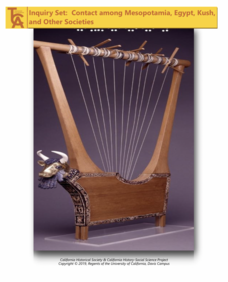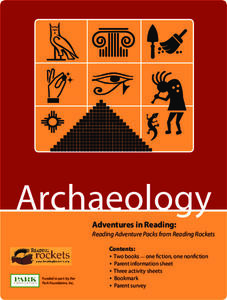Core Knowledge Foundation
Early World Civilizations Tell It Again!™ Read-Aloud Anthology
Ancient world civilizations are the focus of a read-aloud anthology. First graders explore the early world of Mesopotamia, Babylon, the sphinx, and pyramids, get to know people of the Nile, Hatshepsut, and Tutankhamun, and examine world...
New York City Department of Education
Egypt
This six-week unit encompasses all subjects with a focus study on world history and the development of ancient civilizations. As gifted and talented students dive into the interesting yet challenging topic of Egypt, they think critically...
Mary Pope Osborne, Classroom Adventures Program
Mummies in the Morning Egyptian pyramids, hieroglyphics
Visit the Magic Treehouse and take your class on a trip through time with a reading of the children's book Mummies in the Morning. Using the story to spark an investigation into Egyptian culture, this literature unit engages...
Curated OER
Egyptian Counting
Ancient Egyptian's had a fantastic number system and your class gets to use it to practice basic math skills! They are presented with several examples of Egyptian numbers which they use to complete several addition and subtraction...
Curated OER
Ancient Egyptian Art
The history of ancient Egypt can be traced through its art and architecture. Here, each dynasty is defined by its style of art and architectural changes. The resource is intended to accompany a lecture and contains no text.
Curated OER
The Wonders of Ancient Civilizations
Bring excitement and interest to your social studies with a unit on ancient civilizations.
Curated OER
The Achievements and Challenges of Egypt
Awesome, that is all I have to say! This set of lessons provides learners with an understanding of ancient Egyptian laws, lifestyle, religion, and culture. It engages them in a critical analysis activity regarding the film, "The Prince...
Curated OER
Traders of the Lost Art
Learners work in small groups to investigate a variety of art and architecture forms common during the Old Kingdom epoch in Ancient Egypt. Learners then evaluate how these art forms reflect a culture's beliefs and values. And, finally,...
University of California
Hellenistic Culture
It doesn't take long to change the world! Alexander the Great's reign may have been short-lived, but his vision for a multi-cultural Hellenistic world shaped Afroeurasia for centuries. Pupils examine documents, such as excerpts from...
University of California
Contact among Mesopotamia, Egypt, Kush, and Other Societies
Trade has always been a global affair. Explore what global trade meant for ancient Mesopotamians, Egyptians, and Kushites using a collection of documents from the historic societies. By examining literary works such as the Epic of...
PBS
Reading Adventure Pack: Archaeology
Readings of fiction and nonfiction texts followed by a series of activities put scholars in an archaeologist's shoes. Learners read two texts, Archaeologists Dig for Clues by Kate Duke and The Shipwrecked Sailor: An Egyptian Tale with...
Crabtree Publishing
The Genius of the Ancients
It is said that necessity is the mother of invention. Fifth graders prove this with help from three lessons that examine how ancient cultures used their needs to drive innovations. In lesson one, pupils identify main ideas and supporting...
Syracuse University
Ancient World Writing System
Most twenty-first century pupils don't know how to interpret cuneiform. Examining images of cuneiform and papyrus writing and using a chart and Venn diagram, young historians extrapolate what life may have been like for people who lived...
Prairie Public Broadcasting
Egyptian Pyramids Virtual Field Trip!
A virtual field trip takes enthusiastic travelers to the pyramids of Giza. Using Google, scholars explore the grounds of the ancient pyramids found in Egypt then complete three worksheets: a photo analysis page, a reflection sheet, and a...
Annenberg Foundation
Teaching Geography: Workshop 4—North Africa/Southwest Asia
Can Jerusalem be equitably organized? Can Israel and Palestine be successfully partitioned? Part one of a two-part workshop looks at the geo-political history of Jerusalem while Part two investigates Egypt's dependence of the Nile River...
Describing Egypt
Temple of Isis (Philae)
How did the Temple of Isis change throughout history? The resource discusses how architecture changed purposes over the time periods of the Pharaonic Era and the Greco-Roman Era. It gives a glimpse into what life was like and provides...
Describing Egypt
Ty Mastaba
Many know the beauty of a pillared hall, but what makes those from ancient Egypt so breathtaking? An eye-catching resource takes viewers on a journey through the Ty Mastaba to discover the importance of pillars to architecture. They see...
Describing Egypt
Horemheb - (18th Dynasty)
Who was Horemheb and why is his tomb so famous? An fascinating resource uses virtual reality tools and even comes equipped with the ability to use a VR headset. Learners view information panels to the side of the location to understand...
Describing Egypt
Sennedjem - (19th Dynasty)
Who was Sennedjem and how does he relate to ancient Egypt? The resource describes the artisan's life as well as the village in which he lived, called Set Ma'at. Learners view where the people who built the tombs for powerful Egyptians...
Describing Egypt
Ramesses VI - (20th Dynasty)
An interactive tour of the tomb of Rameses VI illustrates ancient Egypt's explanation of life with its intricate drawings and details. Dragging the mouse shows a 365-degree view of the tomb, and details about the meaning of each location...
Describing Egypt
Temple of Kalabsha (Temple of Mandulis)
What was the Kalabsha Temple to ancient Egyptians? Discover the importance of the dock and the use of bodies of water to the Egyptian people. The resource includes side panels with important information about the history of the location.
Describing Egypt
Ptah-Hotep and Akhet-Hotep Mastaba
Did you know that mastaba means bench in Arabic? Learn why a mastaba was so important to ancient Egyptian architecture. Middle and high schoolers alike stay entertained while reading a passage that describes the virtual tour of...
Facts and Files
The Nile
While it may not be possible to take an entire class to Egypt and explore the ancient wonders, it is possible to engage your young historians in activities that ask them to research these and other antiquities and place them on their...
Big Kid Science
Eclipse Classroom Activities: Cultural Significance Project
What better way to celebrate eclipses than across cultures? Explore myths of solar and lunar eclipses from ancient cultures like the Chinese, Ancient Greek, Mesoamerican, Incan, Egyptian, Ancient Babylonian, and Middle Eastern. Learners...

























